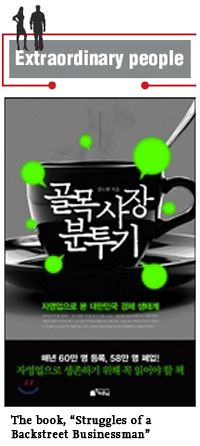Kang tells about realities of coffee shop jungle

Paul Kang, author of “Struggles of a Backstreet Businessman,” claims that the perils of self-employed businessmen are posing a considerable threat to the country’s economic stability. / Korea Times file
How one owner fell into financial abyss and lived to tell about it
A fatigued Korea is about to round out its 15th year of economic ugliness dating back to the crippling foreign currency crisis of the late-1990s. The legacy of these dismal times is represented in the ubiquity of coffee shops, burying Seoul streets like they were carpet-bombed over them.
A massive chunk of the population has been sidelined from the labor market in the series of downturns through the years and millions of these released workers were forced to start their own business out of necessity. The popular options for them were food and beverages outlets like coffee shops, pizza joints and fried chicken pubs, staying true to the old Korean saying that “there’s no business like the eating business.’’
Sometimes it’s best to confine old sayings to the past. For the vast majority of these self-employed people, their prospects for stable income are equivalent to a snowball’s chance in hell.
A recent study by the KB Financial Group showed that nearly half of self-employed businesses derail within three years and more than 75 percent of them fail to last a decade. If these numbers aren’t convincing enough, Paul Kang is ready to provide a depressing, first-hand experience.
It was the autumn of 2009 when Kang, then as an employee of a financial services firm, raised 150 million won with a number of friends and opened a coffee shop near Hongik University, one of Seoul’s most bustling leisure districts. After two and a half money-losing years, the shop was closed and the losses were measured north of 200 million won.
While Kang failed to sell enough coffee, he is showing an impressive ability to sell a book. He is the author of “Struggles of a Backstreet Businessman,’’ a social commentary based on his failed coffee shop experiment, which has been well received by readers and critics.
“When we opened the shop, we knew that we had to sell at least 100 cups of coffee a day to justify the high rents and premiums of the Hongik University area and stay effective as a business. We had thought we could, but we were wrong,’’ Kang said in an interview with The Korea Times.
“What we also failed to account for is that, considering all the coffee shops concentrated in the Hongik University area, there was no way each shop was capable of selling its tables fully and enough cups to stay afloat. The oversupply of coffee shops was obvious and we live in a country where rents are excessively high and will continue to go up despite the shops locating that space will fail, fail and fail.’’
Kang offers a two-point summary of the perils of small shops: there are simply too many of them and rents are criminally high. Korea’s maddening self-employment saga doubles as a story of individual ineptitude and social failure, he says.
There’s nothing strange about 10 percent of these corner shops and snack outlets failing to survive market competition. However, if more than half of these businesses are topping as they are now, it’s time to start questioning whether the market itself has been damaged irrevocably.
Kang’s 112-square-meter shop was located on the second floor of a building in front of the university, with the landlord setting the monthly rent at 3 million won.
While this was much cheaper than the 8 to 12 million won he would have paid for a first floor space of same size, he was still paying more than 4 million won a month in fixed costs when adding maintenance fees and interest on deposits.
And then came the 1.5 million won a month he paid to the barista, the 500,000 won spent on water and electricity and another 1.5 million won for buying coffee beans and other food and drink ingredients.
So Kang needed to earn 6.8 million won every month just to cover the costs, let alone thinking about take-home money. He struggled to make 7 million won even in the best months and these months came too far in between. This was easily understandable because there were 16 other coffee shops within a 300-meter radius.
“When most people set their own shops coming off layoffs or retirement, it’s hard for most of them to start with more than 100 million won. This is not enough money to rent out a large space that could dominate sales in that area,’’ Kang said.
“They have to free themselves from the idea of setting up a `shop.’ With that amount of money, you can’t rely on a business based on renting out a space as the rents and premiums are too steep. A semiconductor salesperson is self-employed and so are computer repairmen. These are the kind of jobs with low fixed costs and are easy to differentiate with skills and innovation. You can’t differentiate that much with coffee shops _ the cup of coffee will always taste pretty much the same.’’
The struggles of self-employed people are symptoms of a decaying labor market. And these symptoms could become the disease that takes down the country’s financial stability.
With these small shops failing so frequently and pushing their owners into irrevocable financial abyss, Korea faces the prospects of an acute retirement poverty problem. Not exactly something you want to here in a country where the household debt mountain of 1 quadrillion won matches an entire year’s gross domestic product (GDP).
About 30 percent of Korea’s economically-active population are self employed, a significantly higher number than any other country in the rich nation. And nearly 60 percent of these small shop owners fail to earn more than 1 million won a month.
A recent report by the Global Entrepreneurship Monitor (GEM) showed that Korea last year had by far the largest proportion among developed economies of people starting a business out of necessity, as opposed to trying out a new idea or innovation, at over 40 percent. This could be regarded as a clear-cut indicator of economic hardship and inequality.
Ireland came in at a distant second at around 30 percent.
Kang claims that the troubles of self-employed people must be dealt with as a welfare issue. It’s truly a vicious cycle: there are not enough jobs to go around, so an increasing number of people are forced to start their own businesses. But with not enough jobs, and incomes reaming stagnant, there isn’t a market for all these shops. To quote Samuel Beckett, it’s truly “birth astride a grave.’’
“I think the priority is to reduce companies’ freedom in replacing their regular workforce with non-regular jobs and also make it harder for them to fire people. Introducing some sort of a layoff tax could be an idea,’’ Kang said.
“The fate of the economy is at stake. Millions of self-employed people are facing a precarious future and the social costs will be dramatically greater if we let them fall deeper into poverty.’’ <The Korea Times/Kim Tong-hyung>

























































